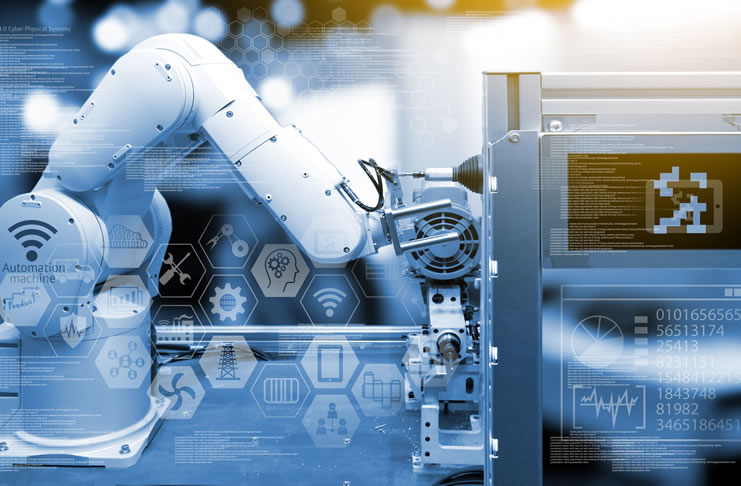INDUSTRY 4.0 Revolutionizing Industry and leading to Smart Manufacturing

INTRODUCTION
Smart manufacturing technology utilizes Internet-connected machinery whose goal is to monitor the production process. It is a specific application that uses Industrial IoT and deploys embedding sensors to collect machine data about the operational status and performance. The major goal of Smart Manufacturing includes identifying opportunities for automation of operations and to use data analytics which will improve manufacturing performance.
This technology is been used by manufacturers to increase efficiency in their factory products. Smart manufacturing is the integration of smart technology in the production process of machines. Generally adopting this technology is a tough task for many companies. They think that it could be labor-intensive, time-consuming, and a costly process. But in reality, it is a cost-saving activity that shortens the timeline of projects.
In the past, information was stored in local databases on the devices individually which is used only in assessing equipment failures. To improve the automation techniques manufacturers took the help of data scientists and with help of techniques involving the Internet of Things, they reach greater levels. The technical standard which needs to be included in sensor data; inhibits machines' communication and share data effectively.

SMART MANUFACTURING AND SMART INDUSTRY
Smart industry and smart manufacturing are the same things. It is the application of technology to make factory processes intelligent. With the modern generation, the products manufactured need to be upgraded and intensively specific to the needs of the customer. So manufacturing involves materials and processing but industry includes the relationship of both material provider and end-user.
To know in detail what are the similarities and differences consider the below points:
- Manufacturing is making goods using raw materials which are to be sold. Industry includes the production of goods which includes manufacturing sectors. The processed products are served to the industry in broader aspects. So, the industry is service-related to both the economy and specific sectors.
- We talk about the industrial revolution but not the manufacturing revolution because these are used interchangeably.
- The industry involves manufacturing businesses, companies, and processes that are in full transformation. Nowadays there is a bridging between physical and digital environments. So thus the machines are becoming exclusive.
DEVELOPMENT AND GROWTH OF SMART MANUFACTURING TECHNIQUE
It is a broad manufacturing category that engages high levels of modifiable and speedy changes, computer-integrated manufacturing, digital information technology, and more resilient technical workforce training. In this, the smart factory has interoperable systems, dynamic modeling, simulation, automation, and security.
It is attributed to studying working inefficiencies and assisting worker safety. 260 years of the Industrial Revolution, the thought came to intellectual manufacturing. Now it is “smart manufacturing” is the fourth revolution and in Europe, it is termed “Industry 4.0”.
The first industrial revolution brought the steam engine and the power loom. By the second revolution assembly line got introduced. In the third revolution, automation took place which enhanced data processing by the 1970s. But in the last decade ‘Industry 4.0’ took place and is enabling an extent in the potential of automated systems. It is represented by the wide range of interconnected systems that are building better digital, physical and biological worlds.

ESSENTIAL FEATURES OF SMART MANUFACTURING
- Increased level of individual work environment
- Digital assistant functions
- Intelligent workplace
- Numerous hardware and software solutions
- Automation with distributed intelligence
- Higher-level specifications and integrated software
- Efficient engineering and rapid networking
- Open standards and independent platform
- Real-time representations and value creation processes
- Decreased development costs and time
- Security and safety
- Value creation and resilient processing
SKILLS REQUIRED FOR DATA-DRIVEN TECHNOLOGY:
In the recent study conducted for determining the skills required to make a smart workforce, results indicated that significant abilities are needed to grow and fill gaps. These important skills are filling the gap between advanced manufacturing and smart competencies.
- Good communication skills
- Understanding and problem-solving skills
- Sustainable practices
- Teamwork is most needed
- Knowledge of installation, repair, production, and maintenance
- Critical and analytical thinking
- Initiatives at every level
- Decision-making ability
Start today implementing these practices to settle and grow in this arena. These skills are self-inventory and will settle for the best. Individuals might find some skills applied in their current position. The results will maximize expanding their roles from their current position.
ADVANTAGES OF SWITCHING TO SMART MANUFACTURING
Many companies are adopting smart manufacturing to boost their production growth with increased efficiencies. In the next few years, these companies or factories will contribute up to $500 billion in the added value of the GLOBAL ECONOMY. According to research, it is evidenced that these factories are capable to produce more at lower costs. Some may gain double profits also.
Below are the benefits of adopting this strategy:
- Better visibility
- Higher opportunities
- Predictive growth and maintenance
- Substantial cost reductions
- Smart operating environment
- Fewer workforce challenges
- Efficient integration and application
- Improved productivity
- Vital accuracy and less waste
- Expertise in the adoption process and speedy results
Glad that you reached here, You must also read a few examples of Intelligent manufacturing to understand Industry 4.0 completely.
Author:
 Vanshika Tiwari
Vanshika Tiwari